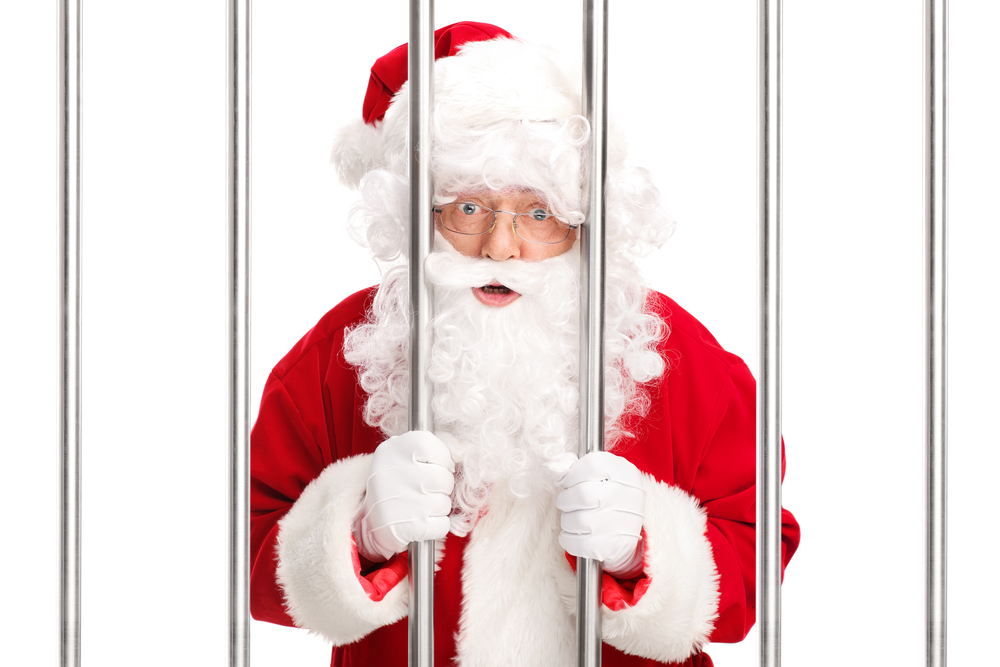Is Santa Claus liable for trespassing?
 It's that time of the year again – the time of the year where you can see Santa Claus decorations and Christmas trees with their different designs and colors in almost everyone's house. The legend of Santa Claus can be traced back hundreds of years ago to a monk named St. Nicholas. It is believed that Nicholas was born sometime around 280 A.D. in Patara, near Myra in modern-day Turkey. Much admired for his piety and kindness, St. Nicholas became the subject of many legends.
It's that time of the year again – the time of the year where you can see Santa Claus decorations and Christmas trees with their different designs and colors in almost everyone's house. The legend of Santa Claus can be traced back hundreds of years ago to a monk named St. Nicholas. It is believed that Nicholas was born sometime around 280 A.D. in Patara, near Myra in modern-day Turkey. Much admired for his piety and kindness, St. Nicholas became the subject of many legends. Santa Claus, as we know him today, has only existed since the 19th century, and he first slid down the chimney in an 1812 book by Washington Irving entitled Knickerbocker's History of New York. The book includes the first known reference of St. Nicholas "rattling down the chimney." This idea of Santa Claus coming down the chimney was then popularized by the 1823 poem "A Visit From St. Nicholas," also known as "'Twas the Night Before Christmas." This poem brought about the Santa we all know and love — plump, jolly, and trespassing in people's homes from the chimney.
Assuming that the idea of Santa Claus coming down from a stranger's chimney is true, is he liable for trespassing?
Trespass to Dwelling is defined and penalized under Article 280 of the Revised Penal Code (RPC), which says: "Any private person who shall enter the dwelling of another against the latter's will shall be punished by arresto mayor xxx.
"If the offense be committed by means of violence or intimidation, the penalty shall be prision correccional in its medium and maximum periods xxx.
"The provisions of [Article 280] shall not be applicable to any person who shall enter another's dwelling for the purpose of preventing some serious harm to himself, the occupants of the dwelling or a third person, nor shall it be applicable to any person who shall enter a dwelling for the purpose of rendering some service to humanity or justice, nor to anyone who shall enter cafes, taverns, inn and other public houses, while the same are open." (Article 280)
On the other hand, under Article 281 of the RPC, other forms of trespass are punished by arresto menor. Article 281 is violated by any person who shall enter the closed premises or the fenced estate of another, while either of them are uninhabited, if the prohibition to enter be manifest and the trespasser has not secured the permission of the owner or the caretaker thereof.
Suppose that Santa Claus enters someone's house by coming down the chimney, there is sense in saying that Santa Claus is accountable for trespassing if it is against the will of the owner of the house. However, it can be argued that, in general, Santa Claus is expected by the people in the house, especially the kids, and he is very much welcome to enter their house. If this is the case, he is not liable for trespassing because it is not against the will of the dweller. In fact, they would love him to go down the chimney and give them presents for Christmas.
If the dwellers do not like Santa in their house, when should they express their objection to Santa's entry in order for him to be liable for trespassing?
For Santa Claus to be held liable for trespassing, the dwellers should express their disapproval upon Santa's entry in their house. In other words, since the law uses the phrase "shall enter the dwelling of another against the latter's will," the will of the home dwellers should be expressed at that time. Hence, if Santa was willingly welcomed into the house and, for example, due to an argument or disagreement the dwellers change their mind and now want him out, that would be a different topic for discussion that may involve the law on unjust vexation, unlawful detainer, etc.
Finally, assuming there is no consent or that the dweller's will is violated, does Santa Claus render some service to humanity that exempt him from violating Article 280 of the RPC?
It can be noticed that Article 280 of the RPC does not apply to any person who shall enter another's dwelling to render some service to humanity or justice. There are opinions giving justification that Santa Claus is not liable for trespassing even if the owner's consent is absent if the former's purpose upon entering the latter's house is to render some service to humanity by giving gifts to the dwellers. It is said that the act of giving gifts can be considered as service to humanity, especially to those who are in need; thus, Santa Claus cannot be held liable for trespassing.
It must be emphasized, however, that the definition of "render some service to humanity or justice" remains vague. It still awaits exhaustive interpretation and discussion from the Supreme Court. (Danica R. Tuliao, contributor)
